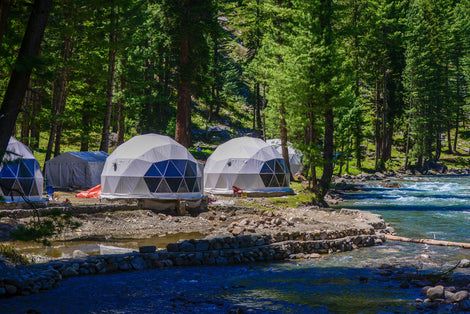Ways to Improve Water Quality in Your Remote Cabin
When you're tucked away in a remote cabin, surrounded by nature and quiet, the last thing you want to deal with is bad water. Whether you're there full-time or just getting away for a bit, the water from your tap needs to be safe. But in places far off the grid, water sources aren't always reliable. That well in the backyard or collection tank beside the shed might hold more than just what you're hoping to drink or shower with.
That’s where water quality steps in. Clean water isn’t just about taste. It’s tied to your comfort, health, and even the lifespan of your appliances. A whole home water filtration system helps you manage all of that, especially when your cabin runs on solar. Everything needs to work together to make remote living easier, and clean water is right at the center of it.
Understanding Water Sources For Remote Cabins
Living off-grid opens up a few different ways to get water, depending on your property. Each water source has benefits but also comes with its own issues. Knowing what you’re working with helps you make better choices about how to clean it up.
Common water sources:
- Wells: Deep wells can pull clean water, but shallow ones can collect surface runoff, especially during rain. That runoff could carry dirt, bacteria, or even chemicals from the surrounding area.
- Rainwater: Great for eco-living, but needs strong filtering. Roof debris, bird droppings, and pollen can build up fast in collection barrels.
- Streams or creeks: Readily available in some spots, but very risky to use untreated. Wildlife activity and decaying plant material often affect water quality.
Let’s say you’ve got a rain catchment setup. You might be drinking from tanks that have been sitting for weeks. Even if the water looks clear, it doesn’t take much for bacteria or algae to grow under the right conditions, especially in late summer when heat and time mix together. Once growth starts, you could be facing more than just bad taste. It could cause odors, clogs, and even affect how your appliances run over time.
Each of these water types needs regular attention. Simple setups may work for short visits, but if you plan to stay longer or use the cabin often, making sure water is filtered before it hits your taps should be a top priority.
Why Whole Home Water Filtration Systems Make Sense
Dirty water shows up in more ways than people expect. Sometimes it’s cloudy. Sometimes it smells weird. Other times you won’t notice anything at all, but your pipes and fixtures slowly fill with sediment or buildup. That’s why targeting every faucet and shower, not just one, is the safest move for off-grid cabins.
Whole home water filtration systems help fix a lot of this before the water gets to you. These are systems installed right where the water enters the home. From that point on, everything benefiting from that water—kitchen sinks, showers, toilets, laundry setups—runs on cleaner water. They keep things simple, minimizing the need to watch over filters in every single room.
Types of stuff these systems can help remove:
- Dirt and debris from runoff or soil
- Rust or sediment found in older pipes or tanks
- Chlorine or sulfur smells if water has chemical traces
- Bacteria that appear in untreated or stored water
- Organic matter from leaves, insects, or algae buildup
Once installed, the system works with your solar-powered lifestyle. Many run without electricity or can be paired with low-draw components so they won’t overload your setup. Long-term, filtering protects not just your health but your plumbing too. Water heaters and faucets last longer when there’s less gunk running through them.
A whole home system can also help prevent those late-night surprises like turning on a tap and noticing the water smells off or looks cloudy. That’s one more thing you shouldn’t have to stress about when you're enjoying time off-grid.
Steps to Improve Water Quality in a Remote Cabin
Even with a good water source and a solid filtration setup, water quality can shift over time. Staying on top of it doesn’t take a lot of effort, but it does require being consistent. A little attention here and there can prevent most water problems from catching you off guard.
Start with water testing. Test your cabin’s water at least twice a year, once in the spring after snowmelt, and again in late summer when rain levels shift. These seasons often bring the most changes in ground level and runoff, which can affect wells and surface supplies. Water test kits are easy to use and help you check for things like bacteria, heavy metals, or common chemicals.
Outside of testing, keeping your system in good condition is key. Use this checklist to guide your regular maintenance:
- Clean or replace filters as recommended by the system manufacturer
- Flush any sediment-catching tanks every few months to prevent buildup
- Inspect pipes for leaks or mineral deposits that could clog flow
- Monitor pressure changes that might suggest a clogged filter
- Double-check that rainwater storage tanks are sealed and clean
Some remote cabin owners also install pre-filters ahead of the main filtration system. This extra step catches larger particles like sand or silt before they reach the finer filters, allowing the main system to work without clogging up. In certain climates, adding a UV purifier can make a big difference too, especially if you're using surface or collected water. It damages the DNA of bacteria and viruses, rendering them inactive before they ever make it through the tap.
Maintaining clean water starts with knowing what's in it, then choosing the right tools and habits to keep it usable long term. If your system’s been neglected or it's acting off, maybe pressure’s dropped or taste is different, it’s worth getting it checked before bigger issues creep in.
How to Choose the Right Water Filtration System
Choosing a water filtration setup depends a lot on where you're getting your water and how often you use your remote property. A cabin you live in all season has different needs than one you visit a few weekends out of the year. Still, some basics apply to almost every setup.
Start with thinking through what your system really needs to handle. If you’re drawing from a shallow well near a lot of surface activity like runoff from hills or farmland, look for a system that tackles both sediment and bacteria. For rainwater, the bigger issue may be pollen, plant matter, or bird droppings, so filtration plus disinfection becomes more important.
Other factors that help narrow down options include:
- Filtration capacity: Match the system to how much water you use daily
- Size of cabin: More bathrooms or taps may require a broader setup
- Power source: Stick with low-energy or nonelectric options for solar-powered homes
- Filter accessibility: Choose filters that are easy to clean or swap out
- Replacement needs: Think about how often you’ll need parts and how easy they are to get
Let’s say your off-grid cabin is in a wooded spot and you’re using well water that runs across clay soil. You’ll probably want a filtration system that has a sediment pre-filter, a carbon filter to handle any small particles or smells, and a UV light to deal with the bacteria. The key is to know your supply and tailor the system to manage the actual risks instead of guessing.
Taking time to size up your daily use and water conditions also helps avoid overbuilding. Overcomplicating a system means more parts to maintain and more chances for something to underperform when it counts most.
Fresh, Safe Water Makes Remote Living Better
Water quality plays a bigger role in off-grid comfort than most people expect. A simple issue like sediment buildup or bacteria in pipes can lead to repeated headaches, not to mention repairs or health concerns. But with the right filtration system, that worry disappears in the background and stays there.
When everything works as it should, you don’t think twice about turning on a faucet, cooking, or rinsing off after a long hike. The water is clean, the system handles it quietly in the background, and you get to enjoy your space without dealing with the usual off-grid workarounds.
Taking control over your water supply is one of the smartest moves you can make for remote living. It keeps things safer, simpler, and a whole lot more comfortable day after day.
Ready to enhance your off-grid setup? Discover how whole home water filtration systems can work alongside your solar living setup. At Green Vista Living, we offer smart ways to support clean water and reliable energy in one easy solution.







